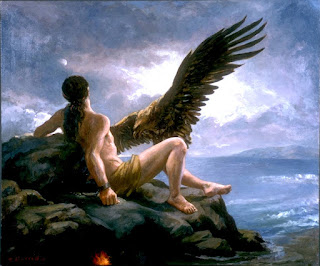Classical and Post-Classical
Prometheus Bound by Aeschylus
Prometheus Unbound by Percy Shelley
Frankenstein; or, The Modern Prometheus by Mary Shelley
Frankenstein Unbound by Brian Aldiss
That sequence forms a neat tetralogy. Aldiss knew what he was doing with that title.
Biblical and Post-Biblical
Genesis
Paradise Lost by John Milton
Frankenstein; or, The Modern Prometheus by Mary Shelley
Perelandra by CS Lewis
A Case Of Conscience and Black Easter/The Day After Judgment by James Blish
Genesis by Poul Anderson
In the second sequence, the theme is creation:
God creates Adam and Eve;
Frankenstein creates the monster;
Maleldil creates a new Adam and Eve on Venus;
Satan possibly creates the Lithians and becomes God;
an Artificial Intelligence re-creates extinct humanity on the future Earth.
Milton retells the theocentric Biblical narrative.
Mary Shelley, quoting Paradise Lost on her title page, initiates the anthropocentric sf tradition which is rejected by Lewis who reaffirms the Biblical-Miltonic tradition.
However, the sf tradition continues:
Blish responds to Lewis;
Anderson is arguably a culmination of this tradition.
The question is: was, or would it be, right to (re)create humanity?

3 comments:
Kaor, Paul!
I'm surprised you did not include Dante's DIVINE COMEDY and Larry Niven and Jerry Pournelle's INFERNO and ESCAPE FROM HELL in the Biblical and Post Biblical section of your list.
And I certainly would say it was right of God to create the human race. Including any other intelligent races existing in the cosmos.
Sean
Sean,
I was trying to focus on narratives that involved creation.
Paul.
Kaor, Paul!
Oops! My bad for not understanding your point!
Sean
Post a Comment